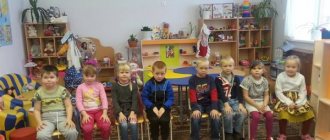Website for kindergarten teachers
Appendix No. 2 from the Work program in the 1st junior group according to the Federal State Educational Standard for the 2016-2017 school year Author: Sordia Larisa Kharisovna, teacher at the MDOU, general developmental kindergarten with priority implementation of activities on the social and personal development of children No. 8, Komsomolsk-on-Amur
| September September | 1 Week | 2 week | 3 week | 4 week | |
| "Meet the Group" Software tasks: — introduce children to the group room and its inhabitants; - develop cognitive activity, vocabulary; - cultivate a friendly attitude towards toys. Grizik T.I. Cognitive development of children 2-3 years old, p. 15 (children go on a group trip by car, get to know the inhabitants of different parts of the group) | "Introducing the Bedroom" Software tasks: - introduce children to the bedroom, to its inhabitants - bedding: pillow, blanket, sheet, mattress, their purpose; - develop cognitive activity, vocabulary; - cultivate a caring attitude towards objects in the bedroom. Grizik T.I. Cognitive development of children 2-3 years old, p. 15 (children go to visit a pillow-toy in the bedroom, get acquainted with its inhabitants, their purpose) | Game "Toy Problems" Software tasks: — to develop in children the ability, with the help of a teacher, to resolve a problematic situation; - develop cognitive activity, vocabulary; - cultivate sympathy for the doll, a desire to help her. Problem situation: Katya doll without a pillow, mattress and blanket is uncomfortable and hard to sleep. Methodology for working on “toy problems” - Grizik T.I. Cognitive development of children 2-3 years old, pp. 10-11 | "Vegetables" Software tasks: — teach to distinguish vegetables (cucumber, tomato, carrot, turnip) by appearance and taste and name them, give an idea of the characteristic features of vegetables; - develop cognitive activity, vocabulary; — cultivate a positive attitude towards people’s work. | ||
| October | “Leaf fall, leaf fall, yellow leaves are flying” Software tasks: - to form elementary ideas about autumn changes in nature (it has gotten colder, the leaves on the trees have turned yellow and are falling), pay attention to the color of the foliage, to the fallen leaves; - develop cognitive activity, vocabulary; - cultivate an emotional response to the beauty of autumn nature. Grizik T.I. Cognitive development of children 2-3 years old, p. 16 (games with leaves at the teacher’s choice) | "Toys" Software tasks: - encourage children to name the toy, its parts, find the properties and qualities that exist in toys; - develop cognitive activity, vocabulary; - cultivate a caring attitude towards toys. (based on the cycle of poems of the same name by A. Barto - two poems to choose from) | Game "Toy Problems" Software tasks: — to develop in children the ability, with the help of a teacher, to resolve a problematic situation; - develop cognitive activity, vocabulary; - cultivate sympathy for the doll, a desire to help her. Problem situation: the doll Katya does not know what toys she was given for her birthday. Methodology for working on “toy problems” - Grizik T.I. Cognitive development of children 2-3 years old, pp. 10-11 | "Fruits" Software tasks: — teach to distinguish fruits (apple, pear) by appearance and taste and name them, give ideas about the characteristic features of fruits; - develop cognitive activity, vocabulary; — cultivate a positive attitude towards people’s work. | |
| november | 1 Week | 2 week | 3 week | 4 week | |
| Bird watching Software tasks: - to form in children ideas about birds - pigeons, crows, sparrows, to encourage them to recognize birds by their appearance, to notice how birds move; - develop cognitive activity, vocabulary; — cultivate emotional responsiveness to the perception of objects of the natural world, a kind attitude towards birds. | "Merry little engine" Software tasks: - encourage children to examine and name the toy and its parts; - develop cognitive activity, vocabulary; - cultivate a caring attitude towards toys. The little train introduces children to its friends: an airplane, a truck and a boat, and their purpose. | Game "Toy Problems" Software tasks: - continue to develop in children the ability to resolve a problem situation with the help of a teacher; - develop cognitive activity, vocabulary; — cultivate sympathy for the truck, a desire to help it. Problem situation: the truck is sad: its body is broken, it cannot transport cargo. Methodology for working on “toy problems” - Grizik T.I. Cognitive development of children 2-3 years old, pp. 10-11 | “Who lives next to us?” Software tasks: - to form in children ideas about animals living next to us (dog, cat, pig, goat, cow), to form the concept of “pets”; - develop cognitive activity, vocabulary; — to cultivate emotional responsiveness to the perception of objects of the natural world, a kind attitude towards animals. | ||
| December | Observation “In December, in December, there is a lot of snow in the yard...” Software tasks: - to form elementary ideas about winter changes in nature, to draw children’s attention to the beauty of the winter landscape (it’s white, light all around, the snow sparkles in the sun, the sky is blue) - develop cognitive activity, vocabulary; - cultivate an emotional response to surrounding natural phenomena. | "Meeting with the Christmas tree" Software tasks: - introduce children to the features of the Christmas tree, compare the Christmas tree with other trees (birch, maple, oak); - develop cognitive activity, vocabulary; — cultivate emotional responsiveness to the perception of objects of the natural world. | Game "Toy Problems" Software tasks: - continue to develop in children the ability to resolve a problem situation with the help of a teacher; - develop cognitive activity, vocabulary; — cultivate sympathy for the Christmas tree, a desire to help it. Problem situation: a Christmas tree came to visit. What to do with it? Methodology for working on “toy problems” - Grizik T.I. Cognitive development of children 2-3 years old, pp. 10-11 | "Guess what Santa Claus brought" Software tasks: - continue to form ideas about familiar objects and toys, encourage them to name them in the picture, guess what is drawn in the picture based on the verbal description; - develop cognitive activity, vocabulary; - cultivate a caring attitude towards objects and toys. | |
| January | 1 Week | 2 week | 3 week | 4 week | |
| Watching the snow Software tasks: - to form in children elementary ideas about the properties of snow (cold, wet, melts in warmth); - develop cognitive activity, vocabulary; — cultivate emotional responsiveness to the perception of objects of the natural world. | "Furniture" Software tasks: - introduce children to the concept of “Furniture”, pieces of furniture and their purpose, encourage them to recognize and name furniture, parts and details of different pieces of furniture by appearance (for a sofa - legs, for an armchair - back, etc.), to distinguish between objects ( sofa, armchair); - develop cognitive activity, vocabulary; - cultivate a caring attitude towards pieces of furniture. | Game "Toy Problems" Software tasks: - continue to develop in children the ability to resolve a problem situation with the help of a teacher; - develop cognitive activity, vocabulary; - cultivate sympathy for the doll, a desire to help her. Problem situation: a new doll came to the group. Where should she live? Methodology for working on “toy problems” - Grizik T.I. Cognitive development of children 2-3 years old, pp. 10-11 | “Who did we meet in the forest?” Software tasks: - to form in children ideas about the inhabitants of the forest (hare, bear, fox, wolf), to form the concept of “wild animals”; - develop cognitive activity, vocabulary; — to cultivate emotional responsiveness to the perception of objects of the natural world, a kind attitude towards animals. | ||
| February | Tree watching Software tasks: - expand ideas about trees: a tree has a trunk and branches; show the characteristics of deciduous and coniferous trees in winter; - develop cognitive activity, vocabulary; - cultivate a caring attitude towards trees, emotional responsiveness to the perception of the winter decoration of trees. | “The residents of the tower are waiting for guests” (dishes) Software tasks: - to develop in children the ability to recognize and distinguish tableware and teaware by appearance, to introduce them to the purpose and properties of the dishes and the material from which they are made; - develop cognitive activity, vocabulary; — cultivate a careful attitude towards utensils. | Game "Toy Problems" Software tasks: - continue to develop in children the ability to resolve a problem situation with the help of a teacher; - develop cognitive activity, vocabulary; - cultivate empathy and a desire to help. Problem situation: the dishes got lost and can’t find their way to the kitchen Methodology for working on “toy problems” - Grizik T.I. Cognitive development of children 2-3 years old, pp. 10-11 | “Who can do what?” Software tasks: — introduce children to the methods of movement of animals (jumping, running, crawling, flying, swimming); - develop cognitive activity, vocabulary; — to cultivate emotional responsiveness to the perception of objects of the natural world, a kind attitude towards animals. | |
| March | 1 Week | 2 week | 3 week | 4 week | |
| Observation "The Coming of Spring" Software tasks: - to form elementary ideas about seasonal changes in nature in the spring (it has become warmer, the snow is melting, puddles and thawed patches have appeared); - develop cognitive activity, vocabulary; - cultivate an emotional response to surrounding natural phenomena. | "Wonderful suitcases" (cloth) Software tasks: - encourage children to distinguish by appearance and name clothes, distinguish similar items of clothing, introduce them to the purpose of items of clothing and its meaning for a person; - develop cognitive activity, vocabulary; - cultivate a caring attitude towards items of clothing. | Game "Toy Problems" Software tasks: - continue to develop in children the ability to resolve a problem situation with the help of a teacher; - develop cognitive activity, vocabulary; - cultivate empathy and a desire to help. Problem situation: the doll doesn’t want to be shaggy at the party. What to do? Bears and bunnies ask to dress them up. How? Methodology for working on “toy problems” - Grizik T.I. Cognitive development of children 2-3 years old, pp. 10-11 | "Moms and Babies" Software tasks: - consolidate children’s knowledge about animals and their cubs, use the names of the cubs, which are formed in a suffix way (kitten, bunny, bear cub, etc.) - develop cognitive activity, vocabulary; — to cultivate emotional responsiveness to the perception of objects of the natural world, a kind attitude towards animals. | ||
| April | Observation "Spring has come" Software tasks: - continue to form elementary ideas about seasonal changes in nature in the spring (the snow has melted, the first grass has appeared, the buds on the trees have swelled); - develop cognitive activity, vocabulary; - cultivate an emotional response to the beauty of the surrounding nature. | Experimenting with water Software tasks: - to form in children elementary ideas about the properties of water - develop cognitive activity, vocabulary; - cultivate an emotional response to surrounding natural phenomena. | Game "Toy Problems" Software tasks: - continue to develop in children the ability to resolve a problem situation with the help of a teacher; - develop cognitive activity, vocabulary; - cultivate empathy and a desire to help. Problem situation: toys want to eat. What? Methodology for working on “toy problems” - Grizik T.I. Cognitive development of children 2-3 years old, pp. 10-11 | "Houseplants" Software tasks: — to form children’s ideas about indoor plants, to consolidate the ability to water plants from a watering can, and wipe the leaves with a damp cloth; - develop cognitive activity, vocabulary; - cultivate a caring attitude towards indoor plants, a desire to take care of them. | |
| 1 Week | 2 week | 3 week | 4 week | ||
| May | Observation “What spring will surprise and enchant” Software tasks: - continue to form elementary ideas about seasonal changes in nature in the spring (trees become covered with leaves, grass grows and thickens, primroses bloom); - develop cognitive activity, vocabulary; - cultivate an emotional response to the beauty of the surrounding nature. | Experimenting with sand Software tasks: — to form in children elementary ideas about the properties of sand; - develop cognitive activity, vocabulary; - cultivate an emotional response to surrounding natural phenomena. | Game "Toy Problems" Software tasks: - continue to develop in children the ability to resolve a problem situation with the help of a teacher; - develop cognitive activity, vocabulary; - cultivate empathy and a desire to help. Problematic situation: in the spring, the molds and scoops rattled in the bag. What do they want? Methodology for working on “toy problems” - Grizik T.I. Cognitive development of children 2-3 years old, pp. 10-11 | "Insects" Software tasks: - to form children’s ideas about insects (fly, butterfly, ladybug, ant), encourage them to distinguish insects by appearance, and name them; - develop cognitive activity, vocabulary; - cultivate emotional responsiveness to the perception of objects of the natural world, a kind attitude towards insects. | |
Read in full Work program in the 1st junior group according to the Federal State Educational Standard for the 2016-2017 academic year
Similar news
- Didactic rationale for organized productive educational activities
- Crisis periods in the development of children - preschoolers
- How to teach a child to do housework
- Working Mom's Fears
- Review “Vegetable garden on the windowsill” (environmental and labor development)
- Project at a preschool educational institution on the topic “Little gardeners”


